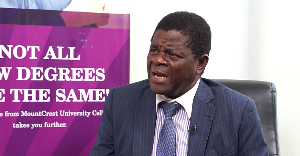Business News of Monday, 18 January 2016
Source: thefinderonline.com
IMF backs ‘killer’ taxes
With Ghanaians yearning for a change in their circumstances after being plagued by economic hardships, especially the recent imposition of numerous taxes and tariffs hikes, the International Monetary Fund (IMF) is urging the government to continue in that direction.
The position of the IMF confirms the suspicion of some economists who said that the recent increases in taxes and tariffs were fuelled by IMF conditionalities.
This further explains why government insists it cannot reverse the increases despite huge public outcry calling for a reversal of the increases.
In a statement issued after a successful second staff level review in November, the IMF board said: “to ensure that gains from fiscal consolidation will be sustained over the medium term, effective implementation of a wide range of ambitious reforms is needed”.
According to the fund, the reforms include measures to broaden the tax base and enhance tax compliance, strengthen control of the wage bill, and enhance public financial management.
“Against the backdrop of continued large financing needs and tight domestic and external financing conditions, the new medium-term debt management strategy is a welcome step to help reduce near-term financing risks while balancing domestic and external financing in a way that will not jeopardise debt sustainability.
The authorities should complement their strategy by stepping up work to deepen the domestic debt market,” it added.
To help bring inflation down towards its medium-term target, the IMF asked the Bank of Ghana (BoG) to stand ready to further tighten monetary policy if inflationary pressures do not recede as expected.
The IMF programme is an attempt to restore macro-economic balance in the face of problems, including inflation running persistently above government targets.
Analysts say this prescription will only increase the cost of doing business and further result in inflation hikes instead of curbing inflation, given that Ghana is experiencing cost push inflation.
End-of-year inflation was 17.7%, compared to the 13.7% projected in a revised budget presented in July despite MPC increasing policy rate by 500 basis points last year alone.
Annual consumer inflation has been consistently above the government's target in the past year, forcing the central bank to announce increases in its benchmark policy rate, which stood at 26 percent in November, from 21 percent in February.
The preparation of an amended Bank of Ghana Act and BoG’s commitment to gradually deepen the foreign exchange market will help make the inflation targeting framework more effective.
“Financial sector stability will need to be monitored closely in a context of deteriorating asset quality.
The BoG should take immediate steps to increase resilience and address weaknesses in asset classification.
“Prompt implementation of the new banking laws currently under review by Parliament is also essential to safeguard financial sector stability,” IMF said.
The difficult financial situation of several state-owned enterprises in the utility sector also calls for strong actions to avoid additional pressures on the budget.
The fund approved the third disbursement of $114.6 million under Ghana's three-year aid programme, urging the government to further tighten fiscal controls to curb rising public debt, the fund said.
The approval followed a successful second staff level review in November, although concerns remained about the country's financial management and rising inflation, the fund said in a statement.
Wednesday's approval brings total disbursements for Ghana to $343.7 million under the programme, which ends next year.
Ghana, a major exporter of cocoa, gold and oil, entered the $918-million financial assistance programme in April, with the aim of restoring economic stability and boosting job growth.
Ghana was once one of the continent's strongest performers, but slumping global commodity prices and a fiscal crisis which drove its debt-to-GDP ratio to more than 70 percent have put a brake on economic growth.
The government is yet to fully resolve a three-year electricity crisis that has crippled industries and made the government unpopular ahead of general elections later this year.
Ghana is currently faced with a sovereign debt crisis, rising interest costs, policy slippages and external shocks, which have dampened the country’s medium-term prospects.
A freeze on employment into the public sector, except the education and health sectors, is biting hard as persons in need of jobs continue to agitate for public sector employment since the current economic conditions do not support private sector business to create jobs.
Government is also to scrap subsidies for utilities and fuel consumption by ensuring that the automatic adjustment formula is implemented to the core.
















